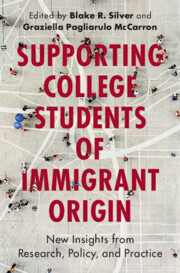Book contents
- Supporting College Students of Immigrant Origin
- Supporting College Students of Immigrant Origin
- Copyright page
- Dedication
- Contents
- Figures
- Tables
- Contributors
- Foreword
- Part I Beginnings
- Part II Experiences
- Chapter 6 Funds of Knowledge as Strategic Food and Campus Navigation at Selective, Affluent Universities
- Chapter 7 Psychosocial Stressors and Coping Strategies in Racially and Ethnically Diverse Undocumented College Students
- Chapter 8 How Colleges Can Support Working Students of Immigrant Origin
- Chapter 9 First-generation College Student Women of Immigrant Origin and Perspectives on the Role of Gender in their Experiences On- and Off-campus
- Chapter 10 Second-generation Afghan Immigrants Navigating Racial and Ethnic Identities in College
- Chapter 11 The COVID-19 Pandemic and Undocumented Hispanic/Latino/x College Men
- Part III Institutional Arrangements
- Part IV Looking Forward
- Epilogue
- Index
- References
Chapter 6 - Funds of Knowledge as Strategic Food and Campus Navigation at Selective, Affluent Universities
from Part II - Experiences
Published online by Cambridge University Press: 16 May 2024
- Supporting College Students of Immigrant Origin
- Supporting College Students of Immigrant Origin
- Copyright page
- Dedication
- Contents
- Figures
- Tables
- Contributors
- Foreword
- Part I Beginnings
- Part II Experiences
- Chapter 6 Funds of Knowledge as Strategic Food and Campus Navigation at Selective, Affluent Universities
- Chapter 7 Psychosocial Stressors and Coping Strategies in Racially and Ethnically Diverse Undocumented College Students
- Chapter 8 How Colleges Can Support Working Students of Immigrant Origin
- Chapter 9 First-generation College Student Women of Immigrant Origin and Perspectives on the Role of Gender in their Experiences On- and Off-campus
- Chapter 10 Second-generation Afghan Immigrants Navigating Racial and Ethnic Identities in College
- Chapter 11 The COVID-19 Pandemic and Undocumented Hispanic/Latino/x College Men
- Part III Institutional Arrangements
- Part IV Looking Forward
- Epilogue
- Index
- References
Summary
The increase of immigrant-origin students in higher education presses the need for new ways of understanding their university experiences. Using the concept of Funds of Knowledge, this qualitative study highlights how students experiencing food insecurity use lessons from their families to strategically navigate selective, affluent environments of resources and privilege.
- Type
- Chapter
- Information
- Supporting College Students of Immigrant OriginNew Insights from Research, Policy, and Practice, pp. 111 - 132Publisher: Cambridge University PressPrint publication year: 2024

